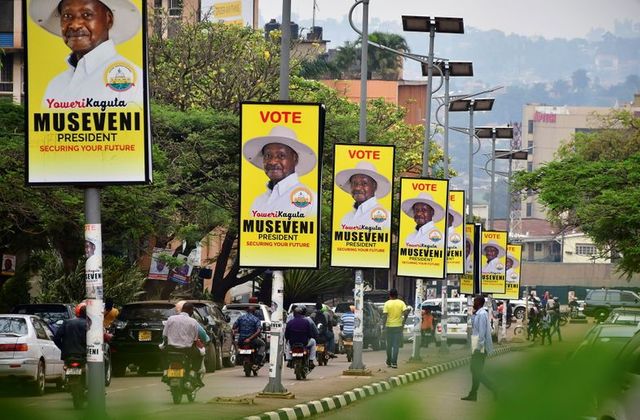Incumbent Ugandan President, Yoweri Museveni, was on Saturday declared the winner of the keenly contested Ugandan presidential elections by electoral officials even as his main rival Bobi Wine has rejected the results alleging widespread fraud in the process.
Museveni won 5.85 million votes, or 58.6%, while main opposition candidate Wine had 3.48 million votes (34.8%), the Electoral Commission said at a news conference on the final results from Thursday’s election.
Earlier, Wine accused Museveni of fabricating the results and called the poll “the most fraudulent election in the history of Uganda”. In a phone interview before the final results were announced, he urged citizens to reject the results.
Read Also: Ugandan Govt Shuts Down Social Media 48 Hours To Election
Wine, a singer-turned-lawmaker, also said his home in the capital, Kampala, was surrounded by hundreds of soldiers and that the military was not allowing him to leave.
The army’s deputy spokesman, Deo Akiiki, told Reuters that security officers at Wine’s house were assessing threats he could face by going out: “So they might be preventing him in the interest of his own safety.”
Soldiers and police were out in force patrolling Kampala on Saturday.
Museveni, 76 and in power for 35 years, campaigned for another term arguing his long experience in office makes him a good leader and promising to keep delivering stability and progress.
Wine, 38, galvanized young Ugandans with his calls for political change and pledged to end what he calls dictatorship and widespread corruption.
Wine, whose real name is Robert Kyagulanyi, said on Friday he had video proof of voting fraud and would share the videos as soon as internet connections were restored. The government ordered the internet shut down the day before the election, and the blackout was still in place.
Electoral Commission Chairman Simon Byabakama said on Friday that under Ugandan law, the burden of proof rested with Wine.
The United States and the European Union did not deploy observer teams, but the U.S. State Department’s top diplomat for Africa, Tibor Nagy, said in a tweet early on Saturday that the “electoral process has been fundamentally flawed”.
He cited fraud reports, denial of accreditation to observers, violence, and harassment of opposition members, and the arrest of civil society activists.
The African Union and East African Community sent observer teams to the election, but neither group of officials responded to requests for comment about possible irregularities.
Police recorded 42 election-related offenses nationwide during voting and tallying so far, police spokesman Fred Enanga said on Friday night on local NBS TV. Offenses included assaults, voter bribery, and theft and damage of electoral materials, he said.
The run-up to Thursday’s election was more violent than in previous polls. Security forces cracked down on opposition candidates and their supporters during the campaign, and more than 50 people died in protests in November on one of the multiple occasions when Wine was arrested.
AFRICA TODAY NEWS, NEW YORK

